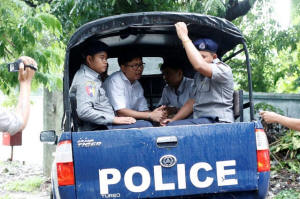|
Myanmar lawyer says evidence from Reuters
reporters' phones may be 'tainted'
 Send a link to a friend
Send a link to a friend
 [May 30, 2018]
By Shoon Naing and Yimou Lee [May 30, 2018]
By Shoon Naing and Yimou Lee
YANGON (Reuters) - Evidence Myanmar police
say they obtained from the mobile phones of two Reuters reporters
accused of possessing secret documents might be "tainted", a defense
lawyer said on Tuesday, because at least one phone was used after it was
confiscated.
A WhatsApp message was sent from the mobile phone of journalist Wa Lone
after he and Reuters colleague Kyaw Soe Oo were arrested on Dec. 12 and
held incommunicado on suspicion of violating the Official Secrets Act,
the defense told the court.
Prosecution witness Police Major Aung Kyaw San, who said he and other
police had examined the phones, told the court he was not aware of the
exchange on WhatsApp and did not know who else used the phones before
their delivery to investigators on Dec 14.
In what has become a landmark press freedom case, the court in Yangon
has been holding hearings since January to decide whether Wa Lone, 32,
and Kyaw Soe Oo, 28, will be charged under the colonial-era Official
Secrets Act, which carries a maximum penalty of 14 years in prison.

Defence lawyer Than Zaw Aung said the one-word text message - "OK" - was
sent via WhatsApp in reply to a question from Reuters' bureau chief in
Myanmar at about 10 p.m., after Wa Lone's phone was taken from him by
police shortly after the two reporters were arrested around 9:10 p.m.
"That means anyone could have access to the phones, so anything could
happen to the phones," a second defense lawyer, Khin Maung Zaw, told
Reuters after Tuesday's proceedings. "All those messages they said were
found in the phones may not be genuine or the phones may be tainted."
Lead prosecutor Kyaw Min Aung declined to comment.
Myanmar government spokesman Zaw Htay was not immediately available for
comment. Previously, he has declined to discuss details of the
proceedings or the police investigation, saying Myanmar's courts were
independent and the case would be conducted according to the law.
Judge Ye Lwin last week accepted as evidence printed copies of documents
that Major Aung Kyaw San, a police IT expert, said were found on the
reporters' phones. The documents included alleged confidential
government letters and plans for the development of an island off
Myanmar's west coast for tourism.
[to top of second column]
|

Detained Reuters journalists Wa Lone and Kyaw Soe Oo leave in a
police vehicle after a court hearing in Yangon, Myanmar May 29,
2018. REUTERS/Ann Wang

Some of the documents came from the Facebook Messenger app, the defense
has said. Defence lawyers say this means the documents could have been
sent by anyone and it was not clear the reporters themselves had even
looked at them.
At the time of their arrest, the reporters had been working on an
investigation into the killing of 10 Rohingya Muslim men and boys in
a village in western Myanmar's Rakhine state.
The killings took place during a military crackdown that United
Nations agencies say sent nearly 700,000 people fleeing to
Bangladesh.
The reporters have told relatives they were arrested almost
immediately after being handed some rolled up papers at a restaurant
in northern Yangon by two policemen they had not met before, having
been invited to meet the officers for dinner.
Last month, Police Captain Moe Yan Naing, who Myanmar's information
ministry said was arrested at the same time as the journalists in
connection with the case, testified that a senior officer had
ordered his subordinates to plant secret documents on Wa Lone to
"trap" the reporter.
At a news conference on May 15, Police Director General Aung Win Oo
dismissed the testimony as untruthful.
After his court appearance, Moe Yan Naing was sentenced to a year in
jail for violating police discipline and his family was evicted from
police housing. Police have said the eviction and his sentencing
were not related to his testimony.

Global advocates for press freedom, human rights activists, as well
the United Nations and several Western countries, have called for
the release of the Reuters journalists.
On Tuesday, diplomats from Denmark and the European Union - as well
as others - observed the proceedings.
The next hearing in the case is scheduled for Monday.
(Reporting By Shoon Naing and Yimou Lee; Editing by Alex Richardson)
[© 2018 Thomson Reuters. All rights
reserved.]
Copyright 2018 Reuters. All rights reserved. This material may not be published,
broadcast, rewritten or redistributed.
Thompson Reuters is solely responsible for this content. |